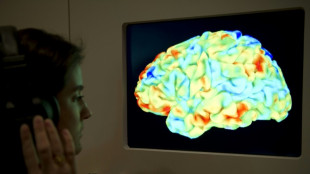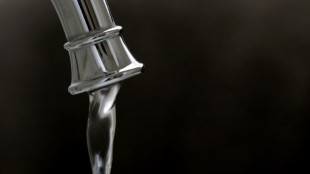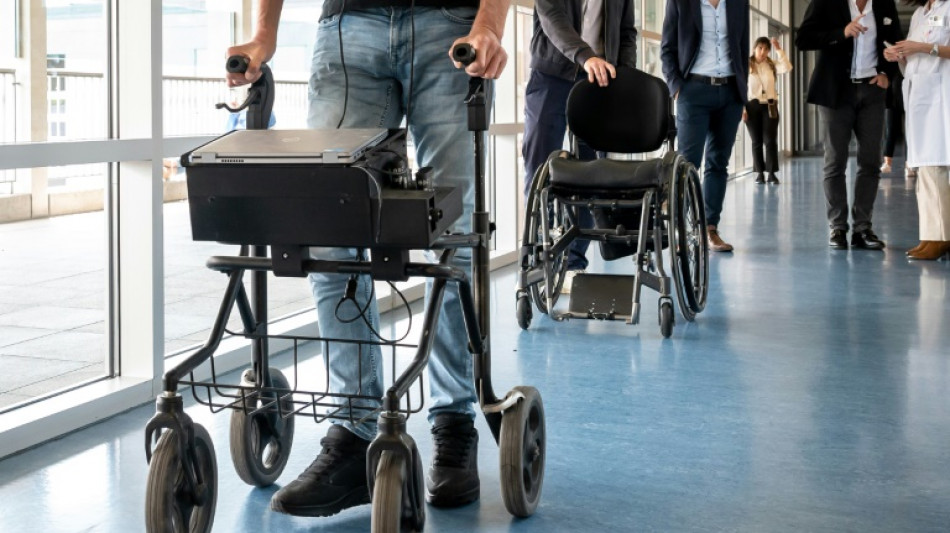
-
 'Incredible' Curry scores 52 as Warriors down Grizzlies, Bucks edge Suns
'Incredible' Curry scores 52 as Warriors down Grizzlies, Bucks edge Suns
-
Asian markets edge up but uncertainty rules ahead of Trump tariffs

-
 Nintendo's megahit Switch console: what to know
Nintendo's megahit Switch console: what to know
-
Nintendo to unveil upgrade to best-selling Switch console

-
 China practises hitting key ports, energy sites in Taiwan drills
China practises hitting key ports, energy sites in Taiwan drills
-
Oil, sand and speed: Saudi gearheads take on towering dunes

-
 All eyes on Tsunoda at Japan GP after ruthless Red Bull move
All eyes on Tsunoda at Japan GP after ruthless Red Bull move
-
'Image whisperers' bring vision to the blind at Red Cross museum

-
 Hay shines as New Zealand make 292-8 in Pakistan ODI
Hay shines as New Zealand make 292-8 in Pakistan ODI
-
Other governments 'weaponising' Trump language to attack NGOs: rights groups

-
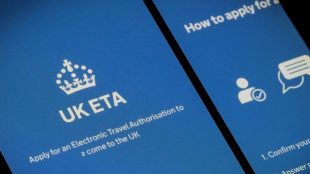 UK imposes online entry permit on European visitors
UK imposes online entry permit on European visitors
-
How a Brazilian chief is staving off Amazon destruction

-
 Meme politics: White House embraces aggressive alt-right online culture
Meme politics: White House embraces aggressive alt-right online culture
-
China launches military drills in Taiwan Strait

-
 US senator smashes record with 25-hour anti-Trump speech
US senator smashes record with 25-hour anti-Trump speech
-
Brazil binman finds newborn baby on garbage route
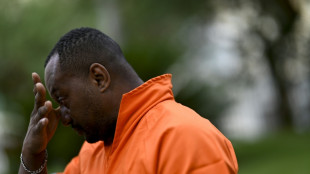
-
 US senator smashes record with marathon anti-Trump speech
US senator smashes record with marathon anti-Trump speech
-
Trump advisor Waltz faces new pressure over Gmail usage

-
 Niger junta frees ministers of overthrown government
Niger junta frees ministers of overthrown government
-
Trump set to unleash 'Liberation Day' tariffs

-
 Boeing chief to acknowledge 'serious missteps' at US Senate hearing
Boeing chief to acknowledge 'serious missteps' at US Senate hearing
-
Real Madrid hold Real Sociedad in eight-goal thriller to reach Copa del Rey final

-
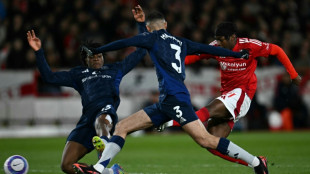 Nuno salutes 'special' Elanga after stunning strike fires Forest
Nuno salutes 'special' Elanga after stunning strike fires Forest
-
PSG survive scare against Dunkerque to reach French Cup final
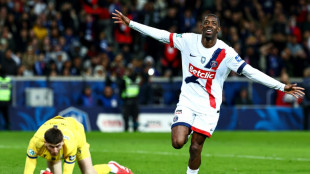
-
 Sundowns edge Esperance as crowd violence mars quarter-final
Sundowns edge Esperance as crowd violence mars quarter-final
-
Nottingham Forest beat Man Utd, Saka scores on Arsenal return
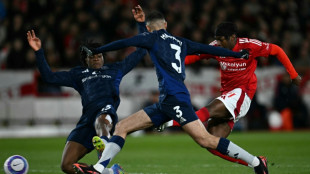
-
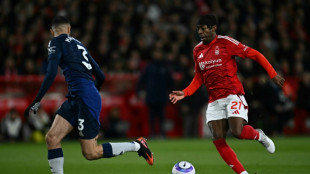 Elanga wonder-goal sinks Man Utd as Forest eye Champions League berth
Elanga wonder-goal sinks Man Utd as Forest eye Champions League berth
-
Stock markets mostly advance ahead of Trump tariffs deadline

-
 US movie theaters urge 45-day 'baseline' before films hit streaming
US movie theaters urge 45-day 'baseline' before films hit streaming
-
Saka scores on return as Arsenal beat Fulham

-
 Third-division Bielefeld shock holders Leverkusen in German Cup
Third-division Bielefeld shock holders Leverkusen in German Cup
-
Ball-blasting 'Torpedo bats' making waves across MLB opening weekend

-
 Newsmax shares surge more than 2,000% in days after IPO
Newsmax shares surge more than 2,000% in days after IPO
-
Thousands of Hungarians protest against Pride ban law

-
 GM leads first quarter US auto sales as tariffs loom
GM leads first quarter US auto sales as tariffs loom
-
Tesla sales tumble in Europe in the first quarter

-
 No 'eye for an eye' approach to US tariffs: Mexico
No 'eye for an eye' approach to US tariffs: Mexico
-
NFL club owners back dynamic kickoffs, delay tush push vote

-
 Trump 'perfecting' new tariffs as nervous world braces
Trump 'perfecting' new tariffs as nervous world braces
-
Trump nominee says to press UK on Israel arms

-
 French court says Le Pen appeal ruling could come before presidential vote
French court says Le Pen appeal ruling could come before presidential vote
-
The battle to control assets behind Bosnia crisis

-
 Prabhsimran powers Punjab to IPL win over Lucknow
Prabhsimran powers Punjab to IPL win over Lucknow
-
Mass layoffs targeting 10,000 jobs hit US health agencies

-
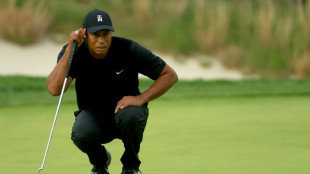 Tiger's April Foolishness: plan to play Masters just a joke
Tiger's April Foolishness: plan to play Masters just a joke
-
Myanmar quake toll passes 2,700, nation halts to honour victims

-
 Turkish fans, artists urge Muse to cancel Istanbul gig
Turkish fans, artists urge Muse to cancel Istanbul gig
-
US seeks death penalty for accused killer of insurance CEO

-
 UK govt moves to block sentencing guidelines for minority defendants
UK govt moves to block sentencing guidelines for minority defendants
-
Trump puts world on edge as 'Liberation Day' tariffs loom


Brain stimulation can help injured people walk: study
Scientists said Monday that electrically stimulating a particular region in the brain could help people with injured spinal cords walk more easily, with one patient describing how the technique allowed him to conquer his fear of stairs.
The new technique is intended for people with spinal cord injuries where the connection between their brain and spinal cord has not been totally severed, and who still have some movement in their legs.
Wolfgang Jaeger, one of two patients who took part in an early trial, said that it immediately made a "big difference" to his mobility.
"Now when I see a staircase with just a few steps, I know I can handle it on my own," the 54-year-old said in a video released alongside a new study in the journal Nature Medicine.
The research was conducted by a Swiss team that has pioneered several recent advances, including using electrical stimulation of the spinal cord to let several paralysed patients walk again.
This time around, the researchers wanted to figure out which region of the brain was most responsible for people recovering from spinal cord injuries.
- 'I feel the urge to walk' -
Using 3D imaging techniques to map out the brain activity of mice with these injuries, the team created what they called a "brain-wide atlas".
They were surprised to find that the brain region they were looking for was in the lateral hypothalamus, which is otherwise known as a regulator for arousal, feeding and motivation.
A particular group of neurons in this region "appears to be involved in the recovery of walking after spinal cord injury," neuroscientist Gregoire Courtine at Switzerland's Ecole Polytechnique Federale de Lausanne told AFP.
Next, the team sought to amplify the signal from these neurons using a procedure called deep brain stimulation, which is commonly used to treat movement problems in people with Parkinson's disease.
It involves a surgeon implanting electrodes in the brain region, which are connected to a device implanted in the patient's chest. When switched on, the device sends electrical pulses up to the brain.
First, the team tested their theory on rats and mice, finding that it "immediately" improved walking, the study said.
The first human participant of the 2022 Swiss trial was a woman who, like Jaeger, has an incomplete spinal cord injury.
Neurosurgeon Jocelyne Bloch told AFP that when the women's device was turned on for the first time, she said: "I feel my legs."
When they turned up the electrical current, the women said, "I feel the urge to walk," according to Bloch.
The patients could turn on their device whenever they needed, and also went through months of rehab and strength training.
The woman's goal was to walk independently without a walker, while Jaeger's was to climb stairs by himself.
"Both of them reached their goal," Bloch said.
- 'No problem' -
Jaeger, who is from the Swiss municipality of Kappel, spoke about facing eight steps down to the sea during a holiday last year.
With the device turned on, "walking up and down the stairs was no problem," he said.
"It's a great feeling when you don't have to rely on others all the time."
Over time, he "became faster and could walk longer" even when the device was switched off, he added.
More research is still needed -- and this technique will not be effective for all patients, Courtine emphasised.
Because it depends on boosting the brain's signal to the spinal cord, it depends how much signal was getting through in the first place.
And while deep brain stimulation is now fairly common, some people are not so "comfortable with someone operating on their brain," Courtine added.
The researchers believe that in the future, the best option for recovering from these kinds of injuries could be stimulating both their spinal cord and lateral hypothalamus.
L.Miller--AMWN
